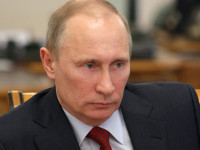
Putin, Czar of Mercy, takes West by surprise

Most Western publications link Putin's decision to release Khodorkovsky with the upcoming Olympics in Sochi. The Russian president, foreign newspapers write, allegedly wants to improve the image of the country, in which, as some believe, human rights are routinely violated.
Time magazine tied Khodorkovsky's release with Putin's will to demonstrate that he "still wins."
"It's a mark of just how comfortable Putin is in power. If vulnerability breeds paranoia, the feeling of strength can reverse it, and so it seemed to go on Thursday when the Russian President pledged to free his oldest enemy, Mikhail Khodorkovsky, who has served 11 years behind bars," Simon Schuster wrote for Time.
"It was already a foregone conclusion in Russia's political circles that Khodorkovsky would not go free until after the parliamentary vote in 2016 and even the 2018 presidential elections, when Putin will be free to run for a fourth term in office. The risk of Khodorkovsky rallying the opposition in the lead up to those campaigns - or even running in them himself - seemed too great for the Kremlin to bear," the journalist continues.
However, taking into consideration Russia's successful year from the point of view of international affairs and the Kremlin's efforts to solve major problems of Syria, Iran and Ukraine, Putin is willing to take risks, Shuster wrote.
According to Sergei Loiko, a journalist of The LA Times, who asked Putin during the large press conference on December 19th on the possibility of Russian troops to be deployed in Ukraine's Crimea, Khodorkovsky's wealth and power have been lost during ten years of his imprisonment, but the positions of the Russian leader are now stronger than ever.
"Khodorkovsky's release would signal an end to a remarkable saga that has been one of the hallmarks of Putin's tenure, and has led to international condemnation of what many view as a high-profile violation of human rights," Loiko wrote.
"With the 2014 Winter Olympics in Sochi just 50 days away, the Kremlin has been anxious to soothe Western criticism of its human rights record. The Russian parliament on Wednesday passed an amnesty law that would drop charges against thousands of Russians and release thousands more.
"Under the amnesty bill, Greenpeace activists arrested in the Arctic are likely to be allowed to go home and jailed members of the punk band Pussy Riot be released. Khodorkovsky would have remained the most prominent politically tainted prisoner. Russia is getting sensitive to improving its image as Sochi approaches and "is on a campaign to kind of defuse the long-time issues," Chris Weafer wrote for The Washington Post.
Noteworthy, Western journalists found Putin's response to the question about NSA activities one of the key moments of Putin's communication with the press. "I envy Obama because he could do all that, and he can only get away with it," the president joked in the beginning of his answer. He then explained that such measures were indeed aimed at combating terrorism. Putin also said that they should not go beyond certain limits.
In addition, Putin said, one should treat most of secret data with skepticism, as this kind of information published in the media is, in fact, a personal opinion of the analyst that published this information.
Pravda.Ru